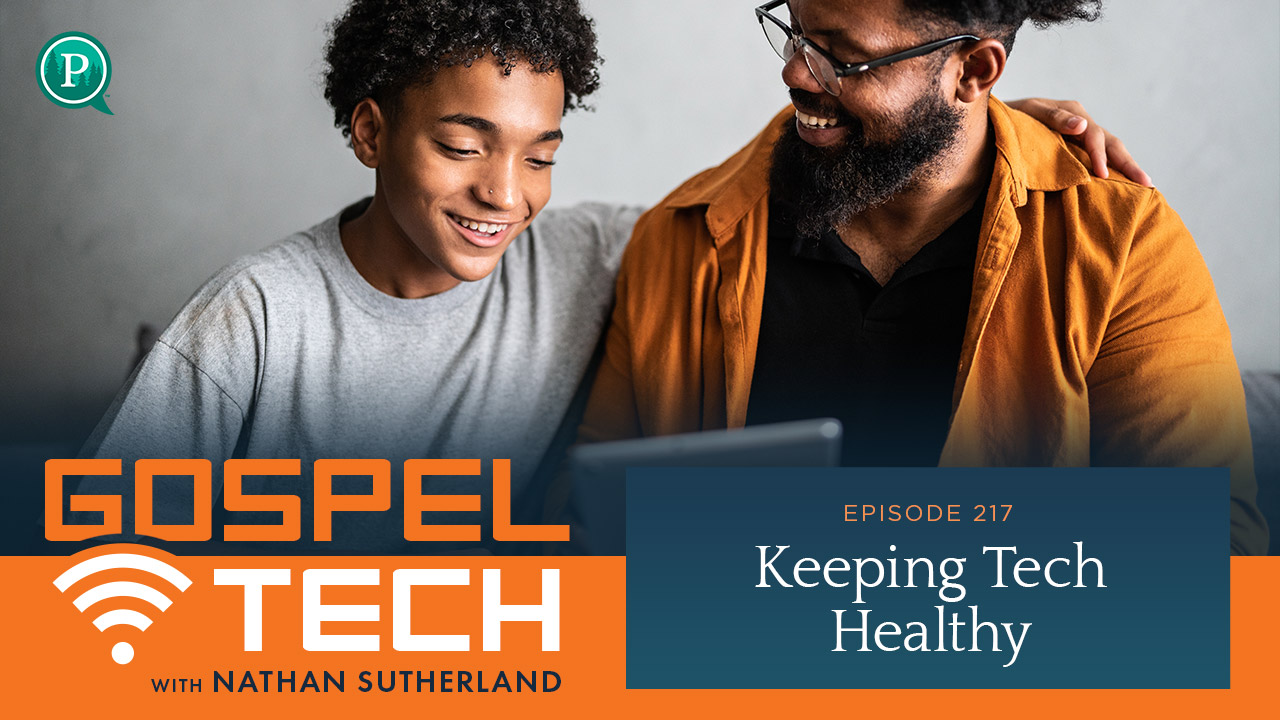We continue our conversation about how to use to use tech well with a look at how to keep our tech use healthy. We do a quick dive into RESET and building hedges, and equip ourselves with the information we need to fight for our children, not just with them, when it comes to tech.
Show Notes:
Ways to listen:
🔗 click the link in the profile
🎧 search Gospel Tech in your favorite streaming service (iTunes, Amazon)
Transcription:
Hello everyone and welcome to the Gospel Tech Podcast. My name is Nathan Sutherland and this podcast is dedicated to helping families love God and use tech. Today we are continuing our conversation about how do we use tech well? Last time, again let me set context. A parent wrote in and said, “Hey, it sounds like from your workshop that tech is just the dirty public restroom of the digital world and that we should just never go there. And if we do go there, there’s really nothing we can do about making it any better.”
First off, I started with an apology saying I clearly did a terrible job as a professional communicator because that is not at all what I was trying to say. But last week I reiterated there are four lies that tech tells us, and I wrote these down to make sure I could recall them in order. It promises to make us smarter, it promises to make us feel better, to connect us and make us belong, and to give us life on our terms. And we talked last week about how it does most of each of those, but it cannot fulfill on any one of those four promises. Those are lies. If you look to tech for any one of those four, it will let you down. And for the most part that’s by design. Some of it’s just because of human limitations, but it’s by design.
And this is both why we are Gospel Tech. We’re trying to take the hope of the gospel, what makes us have purpose and meaning, and then apply it to our tech. So we use tech on purpose, not for purpose. I use it because I am new and have love inside me rather than looking for love.
So today then this is going to be like an abridged quick version. If you’ve never heard Gospel Tech before, this is an amazing introduction to this idea. But the next part is, all right, if there are four lies and I’m now aware of them and I can use tech on purpose, and I gave resources for amazing people who talk about effectively spiritual disciplines, how do we use tech purposefully?
Then in this one we’re just going to review how do I know if the tech I am using or the tech I want to use is healthy and a good choice for me? We’re going to break it down into two sections. We have first, the is the tech healthful right now or moving forward, what conversation we have with ourselves, our spouse, our children, and then how do we make sure that it stays that way and it’s the reset and the three hedges. These are things that I want every single family to know how to do. Every single adult, teacher, parent, mentor, anyone who works with kids, grandma and grandpa, I want you to know these two parts of the conversation and the beauty of it is it doesn’t take long.
So we’re going to dive into those two. I have full dedicated episodes to each of them. If you want to go back to the Start Here series from January into early February of this year, 2024, you will find a whole episode dedicated to the hedges and making tech safe at home and also a whole episode dedicated to the idea of reset. But in a quick overview, it’s simply this. If we know the four lies and we’re looking for it and we’re using our tech purposefully, we’re [inaudible 00:03:02] proper place and we’re using it because it’s helping us or bringing joy not in order to be our joy, then we simply go, “All right, son or daughter of mine, when you use this tech, is it impeding? Does it get in the way of your reset, your relationships and responsibilities, your emotions, sleep, enjoyment and time?”
Quick conversation. This works with six-year-olds and up. It works with adults, it works with friends, it works with spouses and grandparents because grandparents, sometimes you are the ones on the devices. Every talk I go to over the last couple of months, every talk I’ve been to and presented at parents and young people come to me and go, “You know who’s the worst? It’s actually our grandparents.” So you can do this with anyone you care about and it’s a lovely way to make the tech the conversation, not this is not a personal attack. Relationships and responsibilities, does this tech get in the way of relationships? Parents, siblings, friends, coworkers, are you worse at being around the people God has placed you around? And if so, that becomes the conversational point.
Say, “Hey, son or daughter of mine, I’ve noticed when you use this app, play this game or on your phone, watch the show, listen to this music, I noticed that this part of your relational commitments falls off the table, or you become more socially isolated, or you become more abrupt and aggressive and abrasive.” Whatever the thing is, that becomes your talking point. Because the point is not to win an argument. The point is to win a soul, that you can now point and say, “Hey, I can see that this tech is hurting you. I don’t know why, but I can see this is negative. It is not what God’s best is for you. So what’s going on here?” And maybe this child will say, “Oh, you know what? I’m dealing with this outside situation, or I’m feeling really stressed over here, or I haven’t been sleeping well,” or whatever the conversation might be, or it might be you know what? “I kind of feel out of control without tech and I feel like I need it to be okay.”
Then that launches your next part because now you have an open conversation about the tech and you can say, “All right, is this lining up with who you want to be?” Maybe. We have kids sometimes that are just bent on making mistakes, but now you know and now you can pray better and now you can follow up and you can redirect that conversation, and as a parent, lovingly say, “But I don’t believe that’s true for you. I don’t think this is all God’s got for you, is just making it by with just enough tech to not feel miserable.” That’s fine, I get it. We all cope at some point, but that’s not where we want to stay. And so lovingly start that.
The other one is responsibilities. Things like schoolwork, things like family meals, things like house chores, those are all things you’re responsible for and things you’ve committed to. Sports, church involvement. Again, hang out with friends, your yes being yes and no being no.
Then we look at emotions. All we’re looking at here is does your child or does this person you’re talking about, or excuse me, not talking about, talking to, thinking about does this person need tech to be okay? Simply ask that question. Or if you’ve seen it, “Hey, when you don’t get this, you’re not all right. What’s going on?” Again, that’s your conversational touch point.
Then we go to sleep. You need sleep. It’s a gift from God. God gives sleep to the righteous and He denies it to the wicked. So we do not want to allow our tech to kill sleep. That’s something Macbeth does, but not us. We want to pursue sleep deliberately because it is important for learning, it’s important for emotional health, it’s important for physical well-being. If you want to be in better shape, sleep. Sleep burns fat and lack of sleep causes your body to chew on muscle, so you will retain the same amount of weight, but you will have less muscle mass. It’s crazy, but the research is out there. So sleep is important on so many levels, and the one resource I like to reference lots is Matthew Walker’s Why We Sleep. So if you need a book on it and you want to read more deeply into why sleep matters, Matthew Walker would be a great start. UC Berkeley runs the sleep design or sleep clinic there.
So then we go to enjoyment. Again, it’s not whether we like tech, it’s whether tech becomes the all-consuming passion. And I don’t mean your future in tech in that you design games and you make videos and you like podcasting and it’s something you enjoy and get a lot of life from. I’m talking the consumption of tech is now the only thing that truly turns on your light bulb for creativity and energy and everything else you used to love wilts. This one game, this one focus, this one outlet becomes the only thing that brings you joy and everything else you’re just kind of getting through to get back to that. That’s what we’re looking at for enjoyment, and that becomes the conversational talking point.
My 3 kids are 10, 8 and going to be 5, and each of them has unique ways of enjoying the same stuff. They might read the same books or play the same games, but they enjoy them for different reasons. Hadley enjoys them because her entire life is glitter and kitties and unicorns, and so she will just be into that. Today before school, she put on a princess dress and stood in the room and goes, “Daddy, you sit down and watch me dance.” And she turned on a record and proceeded to dance in a princess dress because that’s how she enjoys her morning. That’s unique. So if Hadley then were to find a digital outlet and not love dancing or kitties or sparkles or only enjoy them in this digital format, no longer let them be an outpouring of her joy in real life, she weren’t to just solo dance herself in the living room, I would have conversations about that and go, “Hey, I noticed that you love this thing and I’m concerned because I’ve also noticed you don’t seem to do this other thing anymore.”
And parents, it’s okay that kids grow up and I don’t expect Hadley to be a high schooler throwing a dance party by herself. I do expect to see that same joy and just energy for life to come out into other activities, into other outlets, that she’s going to continue to express because it’s how God’s wired her. She’s been like that for as long as she’s been able to communicate.
And Henry very similar. He has his own ways of communicating and own passions. And Owen, again, a different person, but has passions that are very unique to him, and that’s what we’re looking for for enjoyment. “Son or daughter of mine, I’ve noticed when you go to this space, you pivot, your personality changes, your passions change, and it’s not because you’re an enhanced life form now and you’re better at things. It’s markedly worse what’s happening.” And again, maybe they’re dealing with emotional trauma, maybe they’re dealing with friendship issues, maybe they’re dealing with a lack of mental health, maybe they’re dealing with any number of other things that can happen in life, and tech is just symptomatic of that. Or maybe it is tech. And now you need to talk about what would it look like to get healthy?
Finally on reset, it is time. Can we be content? Again, play your games, watch your shows, enjoy your music. But if it’s something you need, contentment will be one of the major flags that’ll be raised of like, “Yeah, but I just need this around more. I need it in my life. I need it in my ears. I need it plain when I fall asleep. I just need this all the time because there’s some kind of either co-dependence or self-medication.” There’s something happening with this tech where your child’s not okay apart from it, and that’s what we’re looking for. So you have your reset, you know the types of tech, tool and drool that we talked about last week, you know the lies to be looking for and how to use it purposefully. And now you have a reset and you can go, “You know what? My child’s doing awesome. They’ve got a smartphone. They play video games, they’re on the internet. We have family boundaries, and I can tell that my child’s reset is fine right now.”
Awesome. And if it’s not, don’t panic. Just start the conversation. You now have a talking point. This is your win with that kid that can be really abrasive because you’re not fighting the tech and you’re not fighting your child. You’re fighting for your child. And if it means that tech has to become expendable, great, let’s do that because the child is the priority and the tech is optional, and we’ll take as much tech as we can use well, that keeps a healthful reset. And by the way, it is possible to use tech and get better at relationships and responsibilities and emotions and sleep and enjoyment and time. Tech can help those things so look for the positives as well, but don’t allow a small positive to outweigh a huge negative. This is smartphones in school.
“Yeah. Oh, we can search things on the internet and find stuff for research.” That’s not wrong. You can, and the downside for academic focus and relationships and bullying and exposure to pornography and proximity to predators. The number of downsides that come from having that technology present is what grossly outweighs any potential upside of one more search browser. So let’s also just be reasonable when we talk resets about what are the upsides and the downsides and let’s weigh them. That’s why I look for the impeding first. And if there’s no impeding, then we can start to celebrate those wins from the tech that we do add because I’m assuming the tech you add is a win.
Bring you to the second side then is how do we make that tech that we’re adding safe? And I mentioned building hedges earlier. We want to hedge around our devices, our networks, and our family. And in short, devices means you want accountability on every single device that leaves your home. That’s the point of that device is to leave home with your child or your spouse or whomever, yourself, and you need to make sure there’s accountability on there. Accountability for what is seen and done. Bark is an amazing option for your kids, so check it out. Basically, it’s like sending a digital dog with your kid. You’ve trusted them enough to give them this device, so give them the trust they’ve earned. And when something goes wrong, either because your child did it or someone else did it to them, you will be notified. And again, given that parenting win, that opportunity to enter that space because you love your child and you don’t want them to have to self-report. The Fifth Amendment is a thing because self-reporting doesn’t always happen well.
And so instead of forcing people to lie, we go, “You know what? We won’t even ask you to report on yourself. You can claim the Fifth Amendment if you believe this is incriminating, and we won’t even make you stand up here in front of us all and lie to us and now commit perjury.” So your children, if that’s true for adults in the court of law, it’s very true for children in digital spaces. They don’t do great at self-reporting. We want them to, we can train them to be more open and we can have those conversations so they’re ready to look for help and they’ll come back to us like the prodigal son, but we can’t start there. We’ve got to start with some kind of accountability. So that’s devices, hedges around our … Excuse me. Our network means your Wi-Fi needs to have rules set for it. So please find something like Google’s Family Link. Cool. I really like the Griffin Router because it’s a Wi-Fi router that you can set accountability on, that’s very nuanced. If you like your router, you can go with the … Not the Google Circle.
It used to be the Disney Circle, but I believe it’s just called the Circle now. It’s a little box that plugs in or something like the Bark Home. Again, same software that goes on a phone is a piece of hardware here, plugs into the thing that provides your house wireless internet, and lets you set specific apps that can and can’t be used. Time limits, so you could shut down the kids’ devices, but mom and dad can still do work and have the internet because while Comcast sometimes lets you set settings, sometimes it literally is just like the entire internet shuts off at 8:00 PM and sometimes people have things they need to do. So an option for your home wireless network would be something like the Griffin Router or the Bark Home or the Circle.
And then third and finally is the family hedge, building a conversational buffer where your family knows we talk about everything. We’re not scared of the bad words. We can say things like predator, we can say things like sex and pornography, we can say things like depression and self-harm and addiction because we love our children. If we’re not willing to say those words, they probably shouldn’t be in those digital spaces. It’s going to be part of us equipping them, because frankly, they’re not scared of that stuff if they don’t have any context. So you’re not spoiling them, you’re not planting seeds in their minds you’re going to ruin them unless you do it with a, “Don’t ever ask me about pornography.” Don’t do that. Allow your child to understand that, “Hey, there’s this thing out there. It’s a lie. It’s not helpful, and we’re going to address it in as much as we feel like we can.”
Again, there’s entire episodes built around this. If you want to go back to the start here, if you want to go back to, I want to say it’s 182 and 191. Two conversations with Sam Black of Covenant Eyes. He’s the Director of Recovery there, Research and Recovery, I want to say is his title. But he does a great job of addressing those. And you can read books like Good Picture, Bad Picture, where an author does a great job of walking through this idea of unsafe and unhealthy pictures and doesn’t necessarily use the word pornography, especially in the junior version, which is for five to seven year olds.
But introduces the concept that there’s stuff out there that’s not helpful, “That is not what I want for you, son or daughter of mine, and that you can always come to me with, and I will love you and I would help you not because I’m perfect, not because this hasn’t been part of my life, but because I love you and I recognize the lie that it is, and I want you to recognize it sooner than I did because, well, frankly, many of us kind of thought, ‘Oh, ha ha, it’s just something that happens in life.’ And now we recognize like, ‘Oh no, there’s real damage long term to lots of people other than just the individual who consumes it.’ And we want to be at the forefront of that conversation with our kids.”
So now we know last week’s conversation, lies that tech tells us, and what we can do about that, how we can replace that with truth and purposeful tech use. Today, we know how to keep our tech healthy. We know how to check it with a reset and how to build hedges around our family. And next week we’ll talk about a specific scenario of like, “All right, my kid’s ready for tech, what now?” And I’ve condensed that down to the tightest conversation I can without being glib or flippant. So that’s kind of the, what would you call it? The scope and sequence, I guess, of these conversations. And I hope it’s helpful. If it was, would you share it with someone? Would you start these conversations with your family so that you can be using your tech well? And if you have any questions, reach out to me, [email protected], or on Instagram and Facebook at lovegodusetech. And then join us next week as we continue this conversation about how we can love God and use tech.
Follow this podcast:







